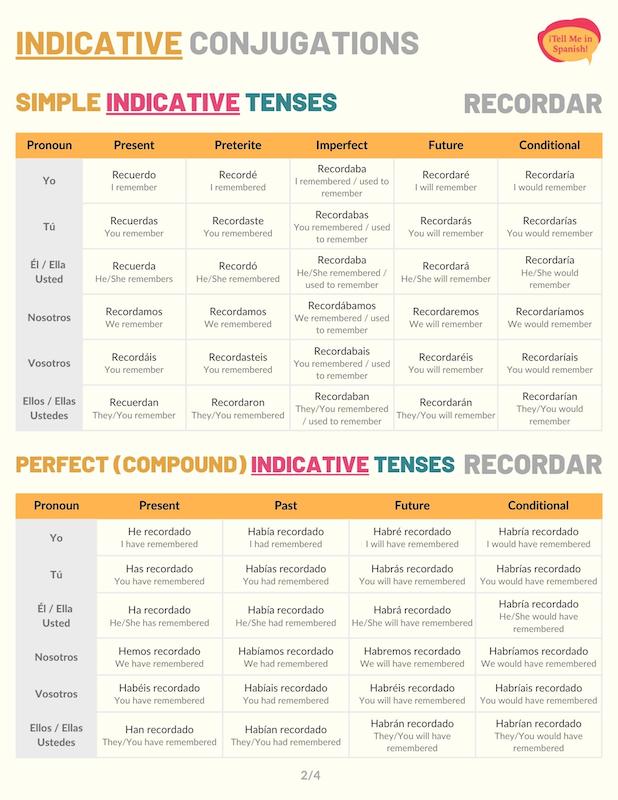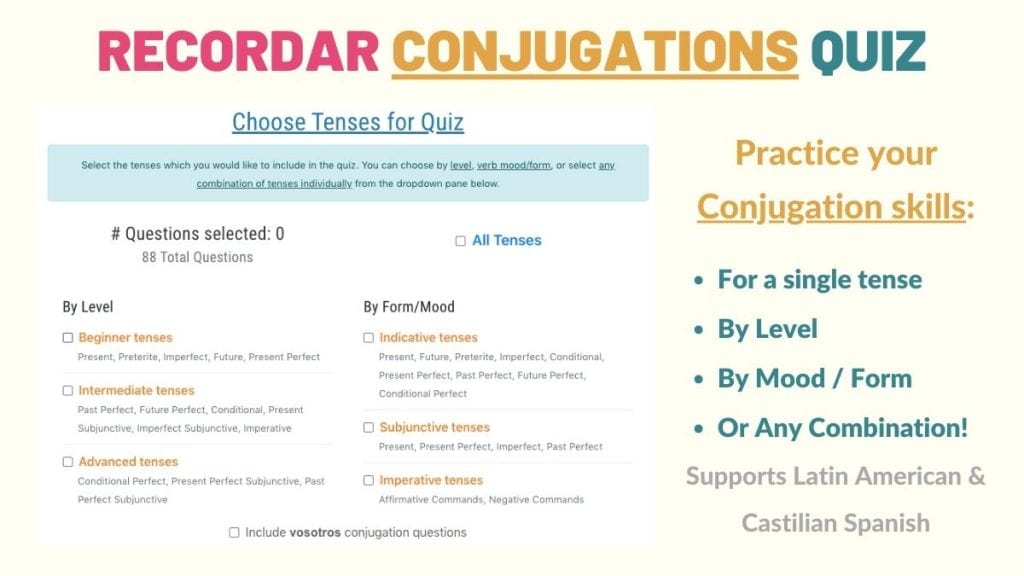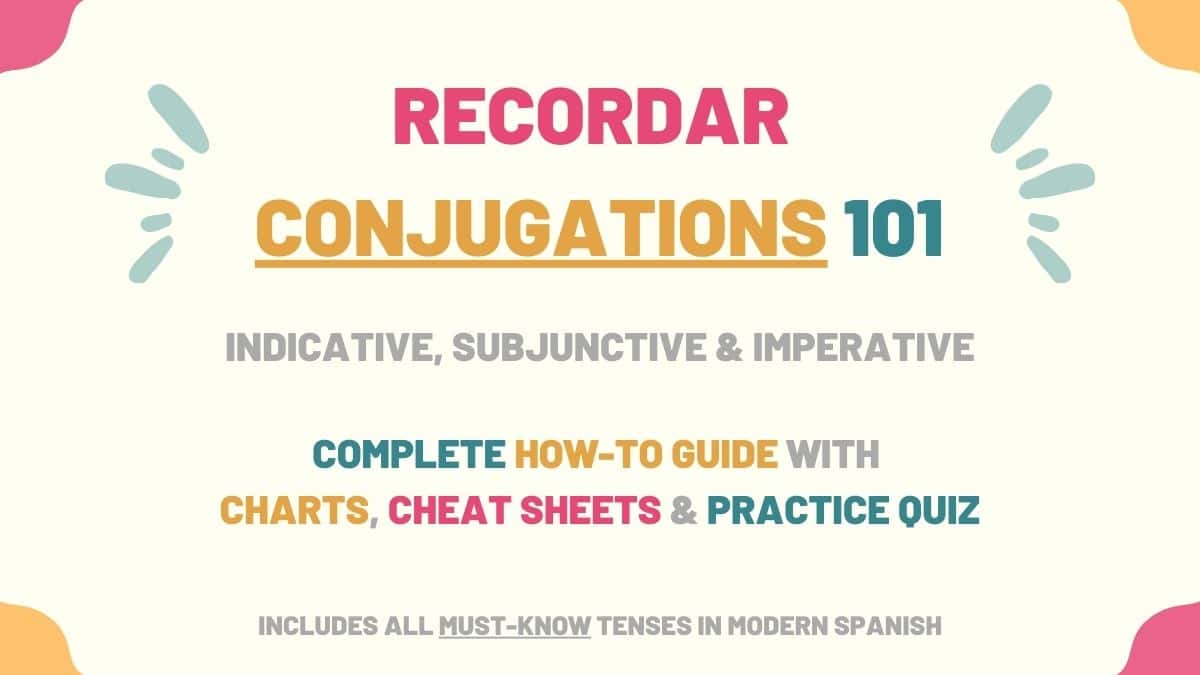Since it allows you to talk about memories and reminders, recordar is a fundamental verb for daily-life conversations. As a result, in this guide, you’ll learn the most important recordar conjugations.
- Recordar Overview
- Indicative Tenses of Recordar Conjugations
- Subjunctive Tenses of Recordar Conjugations
- Imperative (Commands) of Recordar Conjugations
- Uses & Examples
- Download Recordar Conjugation Tables & Uses Cheat sheets
- Recordar Conjugation Practice Quiz
Take Note: There are many tenses in Spanish. However, we don’t use them all. Some are simply old and outdated. As a result, in this guide, you’ll only learn the tenses you need to know to become fluent in Spanish
Overview of Recordar
| Verb Characteristic | Property |
|---|---|
| Verb Type | ‘-AR’ |
| Irregular | No |
| Infinitive | Recordar |
| Gerund (Present Participle) Form | Recordando |
| Past Participle Form | Recordado |
| Synonyms | Acordarse, rememorar |
Stem Changes: –O to -UE
- Present indicative & subjunctive: recuerd for ‘yo’, ‘tú’, ‘ella/él/usted’, ‘ellos/ellas/ustedes’; record for ‘nosotros’ and ‘vosotros’.
- Affirmative imperative: recuerd for ‘tú’, ‘usted’, ‘ustedes’
- Negative imperative: recuerd for all subject pronouns
Recordar can be translated as ‘to remember’, ‘to recall’ or ‘to remind’. For simplicity, I’ve only included one translation in the conjugation examples included in the tables below.
Indicative Conjugations of Recordar
Present tense
With the exception of ‘nosotros’ and ‘vosotros’, the present tense conjugations for recordar have an -O to -UE stem change. With this tense, ‘recordar’ is used to talk about things you currently remember. For example: No recuerdo su nombre.
| Person | Conjugation | Translation |
|---|---|---|
| Yo | Recuerdo | I remember |
| Tú | Recuerdas | You remember |
| Él / Ella Usted | Recuerda | He/She remembers You (formal) remember |
| Nosotros | Recordamos | We remember |
| Vosotros | Recordáis | You remember |
| Ellos / Ellas Ustedes | Recuerdan | They remember You (plural) remember |
Preterite tense
As shown in the conjugation chart below, the preterite forms of ‘recordar’ are regular. We use recordar in the preterite tense to talk about memories or things someone reminded you of something at a specific moment in the past. Chicas, ¿le recordaron a Kate de la fiesta?
| Person | Conjugation | Translation |
|---|---|---|
| Yo | Recordé | I remembered |
| Tú | Recordaste | You remembered |
| Él / Ella Usted | Recordó | He/She remembered You (formal) remembered |
| Nosotros | Recordamos | We remembered |
| Vosotros | Recordasteis | You remembered |
| Ellos / Ellas Ustedes | Recordaron | They remembered You (plural) remembered |
Imperfect tense
The imperfect conjugations of ‘recordar’ are used to talk about things you used to remember repeatedly or memories you had at an unspecified moment in the past. No recordaba que Tina fue novia de Luis.
| Person | Conjugation | Translation |
|---|---|---|
| Yo | Recordaba | I remembered I used to remember |
| Tú | Recordabas | You remembered You used to remember |
| Él / Ella Usted | Recordaba | He/She remembered He/She used to remember You (formal) remembered You (formal) used to remember |
| Nosotros | Recordábamos | We remembered We used to remember |
| Vosotros | Recordabais | You remembered You used to remember |
| Ellos / Ellas Ustedes | Recordaban | They remembered They used to remember You (plural) remembered You (plural) used to remember |
Near future
The immediate future (or near future) is used to talk about things you’ll remember or remind someone of soon in the future. For example, te voy a recordar de tu tarea en unas horas. The near future is formed with ir (present tense) + a + recordar and can be translated as “going to remember”.
| Person | Conjugation | Translation |
|---|---|---|
| Yo | Voy a recordar | I’m going to remember |
| Tú | Vas a recordar | You’re going to remember |
| Él / Ella Usted | Va a recordar | He/She is going to remember You (formal) are going to remember |
| Nosotros | Vamos a recordar | We’re going to remember |
| Vosotros | Vais a recordar | You’re going to remember |
| Ellos / Ellas Ustedes | Van a recordar | They’re going to remember You (plural) are going to remember |
Future simple tense
The future tense communicates that a person will remember something at some point in the future. No te preocupes, no recordarás nada.
| Person | Conjugation | Translation |
|---|---|---|
| Yo | Recordaré | I will remember |
| Tú | Recordarás | You will remember |
| Él / Ella Usted | Recordará | He/She will remember You (formal) will remember |
| Nosotros | Recordaremos | We will remember |
| Vosotros | Recordaréis | You (formal) will remember |
| Ellos / Ellas Ustedes | Recordarán | They will remember You (plural) will remember |
Conditional tense
We use the conditional conjugations of recordar to imply that someone would remind or remember something if certain conditions were met. Si pudiera, yo le recordaría…
| Person | Conjugation | Translation |
|---|---|---|
| Yo | Recordaría | I would remember |
| Tú | Recordarías | You would remember |
| Él / Ella Usted | Recordaría | He/She would remember You (formal) would remember |
| Nosotros | Recordaríamos | We would remember |
| Vosotros | Recordaríais | You would remember |
| Ellos / Ellas Ustedes | Recordarían | They would remember You (plural) would remember |
Present perfect tense
The present perfect tense of ‘recordar’ is used to talk about things you have or haven’t remembered. For example, ¿has recordado lo que me querías decir? The present perfect is conjugated with the formula haber (present tense) + recordado.
| Person | Conjugation | Translation |
|---|---|---|
| Yo | He recordado | I have remembered |
| Tú | Has recordado | You have remembered |
| Él / Ella Usted | Ha recordado | He/She has remembered You (formal) have remembered |
| Nosotros | Hemos recordado | We have remembered |
| Vosotros | Habéis recordado | You have remembered |
| Ellos / Ellas Ustedes | Han recordado | They have remembered You (plural) have remembered |
Past perfect
In the past perfect tense, ‘recordar’ allows you to explain that someone remembered something before some other reference point in the past. Ayer, Billy todavía no había recordado nuestra reunión.
| Person | Conjugation | Translation |
|---|---|---|
| Yo | Había recordado | I had remembered |
| Tú | Habías recordado | You had remembered |
| Él / Ella Usted | Había recordado | He/She had remembered You (formal) had remembered |
| Nosotros | Habíamos recordado | We had remembered |
| Vosotros | Habíais recordado | You had remembered |
| Ellos / Ellas Ustedes | Habían recordado | They had remembered You (plural) had remembered |
Future perfect
Recordar’s future perfect conjugations express that someone will have reminded or remembered something by or before a certain time in the future. For example, en unas horas habrás recordado lo que te dije.
| Person | Conjugation | Translation |
|---|---|---|
| Yo | Habré recordado | I will have remembered |
| Tú | Habrás recordado | You will have remembered |
| Él / Ella Usted | Habrá recordado | He/She will have remembered You (formal) will have remembered |
| Nosotros | Habremos recordado | We will have remembered |
| Vosotros | Habréis recordado | You will have remembered |
| Ellos / Ellas Ustedes | Habrán recordado | They will have remembered You (plural) will have remembered |
Conditional perfect
‘Recordar’ conjugated to the conditional perfect tense talks about things you would have remembered if a past condition had been met. For instance: no habría recordado esto sin tu ayuda.
| Person | Conjugation | Translation |
|---|---|---|
| Yo | Habría recordado | I would have remembered |
| Tú | Habrías recordado | You would have remembered |
| Él / Ella Usted | Habría recordado | He/She would have remembered You (formal) would have remembered |
| Nosotros | Habríamos recordado | We would have remembered |
| Vosotros | Habríais recordado | You would have remembered |
| Ellos / Ellas Ustedes | Habrían recordado | They would have remembered You (plural) would have remembered |
Progressive tenses
The progressive tenses forms of ‘recordar’ imply that someone is remembering or reminding something to another at the moment of speaking. For instance: le estoy recordando a Patty de la fiesta. To form the progressive tenses, you must conjugate estar and use the gerund of ‘recordar’.
| Progressive Tense | Formula | Translation Example |
|---|---|---|
| Present | Estar (present) + recordando | I am remembering |
| Preterite | Estar (preterite) + recordando | You were remembering |
| Imperfect | Estar (imperfect) + recordando | He was remembering |
| Future | Estar (future) + recordando | We will be remembering |
| Conditional | Estar (conditional) + recordando | They would be remembering |
Recordar Subjunctive Conjugations
In Spanish, the subjunctive is used to talk about wishes, hypothetical situations or express uncertainty. The conjugation charts below show the subjunctive forms of recordar.
Present subjunctive
Like the present indicative forms, some of the present subjunctive conjugations of recordar will have -O to -UE stem changes. We use recuerd- for all subjects except ‘nosotros’ and ‘vosotros’. In this tense, ‘recordar’ can be used to talk about the things you want people to remember or remind you. Te pido que le recuerdes a Jossie de mi dinero.
| Person | Conjugation | Translation |
|---|---|---|
| Yo | Recuerde | I remember |
| Tú | Recuerdes | You remember |
| Él / Ella Usted | Recuerde | He/She remembers You (formal) remember |
| Nosotros | Recordemos | We remember |
| Vosotros | Recordéis | You remember |
| Ellos / Ellas Ustedes | Recuerden | They remember You (plural) remember |
Present perfect subjunctive
Haber in the present subjunctive + recordado is the structure you should use to build the present perfect subjunctive form of ‘recordar’. With this tense, recordar can be used to express expectations or uncertainty about the things people remembered. Ojalá Lily le haya recordado a James.
| Person | Conjugation | Translation |
|---|---|---|
| Yo | Haya recordado | I have remembered |
| Tú | Hayas recordado | You have remembered |
| Él / Ella Usted | Haya recordado | He/She has remembered You (formal) have remembered |
| Nosotros | Hayamos recordado | We have remembered |
| Vosotros | Hayáis recordado | You have remembered |
| Ellos / Ellas Ustedes | Hayan recordado | They have remembered You (plural) have remembered |
Imperfect subjunctive
We use the imperfect subjunctive of ‘recordar’ to talk about things we wanted someone to remember. This tense can also be used to express uncertainty about what a person remembered. For example: si recordara su nombre, todo sería más fácil.
The imperfect subjunctive has two conjugation models depending on which type of Spanish you’re using:
Latin American Spanish version
| Person | Conjugation | Translation |
|---|---|---|
| Yo | Recordara | I remembered |
| Tú | Recordaras | You remembered |
| Él / Ella Usted | Recordara | He/She remembered You (formal) remembered |
| Nosotros | Recordáramos | We remembered |
| Ellos / Ellas Ustedes | Recordaran | They remembered You (plural) remembered |
The table above doesn’t include the conjugation for vosotros because this pronoun is not used in Latin American Spanish.
Castilian Spanish version
| Person | Conjugation | Translation |
|---|---|---|
| Yo | Recordase | I remembered |
| Tú | Recordases | You remembered |
| Él / Ella Usted | Recordase | He/She remembered You (formal) remembered |
| Nosotros | Recordásemos | We remembered |
| Vosotros | Recordaseis | You remembered |
| Ellos / Ellas Ustedes | Recordasen | They remembered You (plural) remembered |
Past perfect subjunctive
In the past perfect subjunctive, recordar communicates that someone would have remembered something if a past circumstance was met. In this tense, ‘recordar’ can also be used to make hypotheses about what would happen if someone had remembered something. For example: si me hubieras recordado a tiempo, te habría ayudado.
| Person | Conjugation | Translation |
|---|---|---|
| Yo | Hubiera recordado | I had remembered |
| Tú | Hubieras recordado | You had remembered |
| Él / Ella Usted | Hubiera recordado | He/She had remembered You (formal) had remembered |
| Nosotros | Hubiéramos recordado | We had remembered |
| Vosotros | Hubierais recordado | You had remembered |
| Ellos / Ellas Ustedes | Hubieran recordado | They had remembered You (plural) had remembered |
Aprender Imperative Conjugations
Commands in Spanish allow us to tell others what to do (affirmative commands) or what not to do (negative commands).
Affirmative commands
With the exception of vosotros, all the affirmative commands of ‘recordar’ use the stem recuerd-. We use the affirmative imperative to order someone to remember or remind something to another person. Recuérdame que necesitamos leche.
| Person | Conjugation | Translation |
|---|---|---|
| Tú | Recuerda | Remember |
| Usted | Recuerde | Remember |
| Vosotros | Recordad | Remember |
| Ustedes | Recuerden | Remember |
Negative commands
Below is the conjugation chart for the negative commands of ‘recordar’. These conjugations are difficult to find in conversations because it’s uncommon to order someone to not remember something.
| Person | Conjugation | Translation |
|---|---|---|
| Tú | No recuerdes | Don’t remember |
| Usted | No recuerde | Don’t remember |
| Vosotros | No recordéis | Don’t remember |
| Ustedes | No recuerden | Don’t remember |
Meanings of Recordar & Examples
Below are some sentences with recordar in different tenses. You’ll also find common applications and elements you must use with this verb.
Talking about memories and reminders
Que yo recuerde esta no es la casa de Larry.
As far as I remember this is not Larry’s house
¿Ya recordaste cómo se llama este lugar?
Did you already remember the name of this place?
Gracias por haberme recordado.
Thank you for reminding me.
Craig nos recuerda a su papá.
Craig reminds us of his dad.
Take Note: When using indirect object pronouns, ‘recordar’ means ‘to remind’. Do not confuse this meaning with ‘me acuerdo’! Acordarse is a synonym of ‘recordar’, but it doesn’t work with the same elements. Click here to check the difference.
Download Recordar Conjugation Tables & Uses Cheat sheets

I’ve created a PDF for you to download containing all of the conjugation tables, verb characteristics, and uses so you can study it at your own pace!
Practice Quiz: Recordar Conjugation

Practice your conjugation skills for ‘recordar’ by taking our verb conjugation practice quiz, where you can choose any combination of tenses you’d like to focus on.



